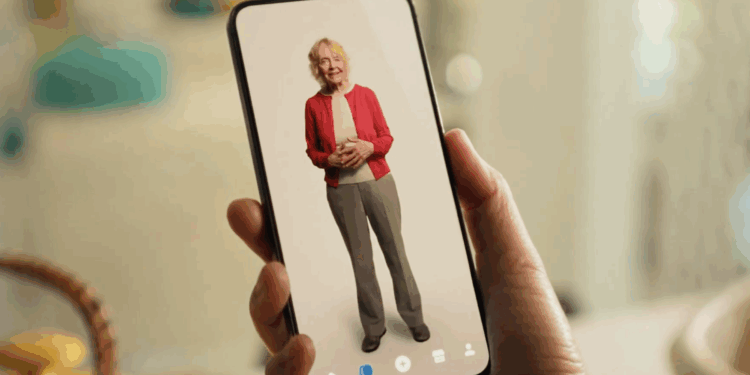The year is 2025. You froze your eggs a decade ago, after your live-in boyfriend dumped you on your 30th birthday. You’re about to start your fifteenth round of IVF, and if this one doesn’t work, you have a color-coded list of surrogacy agencies to call. But your parents are pushing 70, and you feel some guilt thinking about the years your kids could have spent with them. Thankfully, former Disney child star Calum Worthy and his company 2wai have an app for that: In between trips to the IVF clinic, you can digitize your parents and create immortal AI clones of them that will haunt your children forever.
An ad posted last week, which has since been viewed more than 40 million times on X alone, features a pregnant woman talking to an AI avatar of her own mother on her phone, and goes on to show the grandma avatar present at various stages of the pregnancy and eventually the child’s life, until he is grown and expecting a child of his own. This touching act of necromancy was possible, the ad reveals at the end, because grandma recorded a three-minute video of herself before she died and her daughter uploaded it to 2wai. (An older ad from June boasts that you can use 2wai to talk to historical figures, your favorite influencers, or even yourself. In a porn-addled society, what could go wrong?)
The ad’s suggestion that lost loved ones can be rendered obsolete in minutes by soulless video game characters is repulsive and deeply disrespectful to the memories of the dead. Judging by the online response, most people innately understand there’s something very wrong with it. Even “Saturday Night Live” had a skit over the weekend poking fun at an AI algorithm for bringing old family pictures to life in bizarre and disturbing ways. No one wants a creepy Minecraft Grandma.
The goal, however — triumph over the physical world and, ultimately, over death — is far more tempting. We’ve been lusting after it since Eden, desiring to play at being God.
It’s the same insidious desire that drives many to assisted reproductive technologies. While IVF, gamete donation, and surrogacy are billed as compassionate treatments to help earnest couples struggling with fertility, they are often used to facilitate the lifestyles of women who could have had children naturally but chose to delay doing so by decades, thanks to the promised flexibility of reproductive tech. “Freeze your eggs, free your career,” promised a glowing feature in Bloomberg Businessweek in 2014. A 2015 study found that women in Israel, which offered free IVF to citizens, were more likely to delay marriage in favor of career opportunities due to the availability of IVF later in life. Women in the United States are also waiting longer to have children, with more first-time mothers at or above the age of 30 than below the age of 25.
The fine print is that IVF isn’t as easy or successful as it’s claimed to be, and some 93 percent of embryos created in the IVF process will perish. Catholic News Agency broke down the math, and estimated that every year IVF results in the creation of more than 1.5 million embryos that will never be born.
The growing surrogacy industry is an even more physically obvious attempt to circumvent the natural course of reproduction. By 2020, thousands of babies were being born via surrogate in the United States each year. Celebrities like Rebel Wilson and Kristen Wiig, who each became mothers in their 40s to children carried by surrogates, normalize a process that’s anything but. Story after story of surrogacy gone wrong tells of vulnerabilities in the under-regulated industry that enable traffickers, surrogate abuse, and eugenic attitudes. Even in cases where a child goes home with both of his genetic parents — the best-case scenario in surrogacy — he is still ripped away from his birth mother, with whom he’s bonded for nine months. But IVF, gamete donation, and surrogacy are often employed to deliver children to single people, gay couples, or parents with no genetic relation to the baby, intentionally creating a motherless or fatherless child. It’s not just grandma whose existence has been divorced from her physical body; with surrogacy and artificial wombs, mom’s will be too.
[READ NEXT: Worried About An AI Dystopia? The Global Fertility Industry Has It Beat By Decades]
These practices prey on parents’ desire not just to override their own physical limitations, but even to override the genetic limitations of their offspring. IVF embryos are routinely ranked and selected for their quality and lack of genetic or chromosomal anomalies. Some clinics even allow parents to select embryos based on their sex. New startups like Orchid take the eugenics a step further, inviting parents to screen their embryos and discard the ones with higher risks of being blind, or getting cancer, or having mental health disorders.
Just like the fad of mutilating your body to appear like the opposite sex, it’s an attempt to circumvent the confines of our created bodies. While some of these attempts sound noble — who doesn’t want more babies and less cancer in the world? — the destructive methods of assisted reproductive technologies result in life being valued less, not more.
The same goes for uploading grandma to the cloud. Worthy’s ads are designed to appeal to the value of grandma’s life, promising a way to extend it. But they ultimately strip her of both body and soul, reducing her to a Tamagotchi pet. The ad shows grandma being passed down from mother to son; how many generations is this supposed to continue? What happens when you have a digital pantheon of dozens of deceased relatives? Do you conference call them every time you have a life event, or eventually … delete them?
The process of creating and raising each generation is a beautiful one (and very much a physical one, in case you — like the Washington Post’s Philip Bump — weren’t sure how it works). If you wouldn’t outsource your mother’s role in your child’s life, why would you intentionally outsource major elements of yours?
Men and women are designed for falling in love with each other, for that love to produce children, and for raising those children in the shelter of a mother’s and father’s care. One of the many beauties of this design is that our legacies, carried by our very flesh and blood, are made to outlive us.
Worthy captioned his ad with the question, “What if the loved ones we’ve lost could be a part of our future?” The reality is, they already are. Their legacies are present in our stories, habits, recipe books, and memories — in the houses they’ve built, and in the dimples of their great-grandchildren. My cousin just got married at the lake house built by our grandparents, where we spent our childhoods. Our late grandmother’s legacy was infinitely more present there than it could ever be in a cheap digital counterfeit.
Worthy’s gimmick is easy to mock, but it’s not the only counterfeit being marketed to us. The urban, digital world we inhabit is not just untethering us from the physical world, but giving us the hubris to think we can override it. Twenty-first-century magicians promise to circumvent the physical design of the natural order, from childbearing to the sex binary.
Like Worthy’s app, their cheap attempts are abusing, not augmenting, the real thing. We are embodied souls, concurrently inhabiting both a physical realm and a spiritual one, both of which are governed by the natural laws of an orderly, righteous, and omnipotent God. Rebellion against the laws of the former is almost always a real rebellion against the latter.
Elle Purnell is the assignment editor at The Federalist. She has appeared on Fox Business and Newsmax, and her work has been featured by RealClearPolitics, the Tampa Bay Times, and the Independent Women’s Forum. She received her B.A. in government with a minor in journalism. Follow her on Twitter @_ellepurnell.

















